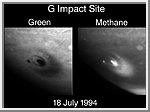|
COMETS EARTH JUPITER KUIPER BELT MARS MERCURY METEORITES NEPTUNE OORT CLOUD PLUTO SATURN SOLAR SYSTEM SPACE SUN URANUS VENUS ORDER PRINTS
PHOTO CATEGORIES SCIENCEVIEWS AMERICAN INDIAN AMPHIBIANS BIRDS BUGS FINE ART FOSSILS THE ISLANDS HISTORICAL PHOTOS MAMMALS OTHER PARKS PLANTS RELIGIOUS REPTILES SCIENCEVIEWS PRINTS
|
Related Document
Download Options
This image shows two views of the impact zone on Jupiter of fragment G of Comet Shoemaker-Levy 9. The image on the left was made in green light with the Planetary Camera channel of the Wide Field Planetary Camera 2 (WFPC2). The image on the right is the same field taken through the WFPC2 methane filter. Data for the images were obtained in the early morning hours of July 18, 1994. The impact site is visible as a complex pattern of circles seen in the lower left of the partial planet image. The small dark feature to the left of the pattern of circles is the impact site of fragment D. The dark, sharp ring at the site of the fragment G impact is 80% of the size of the Earth. Comet Shoemaker-Levy 9 broke up into 21 fragments during a close passage by Jupiter in July of 1992. Fragment G was one of the brightest and likely the largest of the 21 fragments. The remaining fragments will continue to impact Jupiter through July 22, 1994. Scientists estimate that the combined energy from all of the impacts will approach the equivalent of 40 million megatons of TNT. Jupiter was approximately 477 million miles (767 million kilometers) from Earth when the image was taken. Credit: Dr. Heidi Hammel, Massachusetts Institute of Technology, NASA HST. Hubble Space Telescope Science Institute 3700 San Martin Drive Baltimore, MD 21218 (410) 338-4707 |
